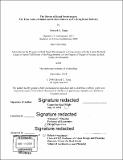The drivers of retail performance : the true value of online and in-store sales in an evolving retail industry
Author(s)
Tung, Edward C. (Edward Chenyee)
DownloadFull printable version (12.67Mb)
Alternative title
True value of online and in-store sales in an evolving retail industry
Other Contributors
Massachusetts Institute of Technology. Center for Real Estate. Program in Real Estate Development.
Advisor
William C. Wheaton.
Terms of use
Metadata
Show full item recordAbstract
This thesis examines the spatial and operational efficiencies of major US retailers in relation to their physical real estate and e-commerce footprints. The continued rise of e-commerce has altered the dynamics of the retail industry in such a way that has forced retailers to drastically reallocate their resources to stay profitable. One of the biggest questions modern retailers face is how much traditional brick and mortar retail space should be retained as opposed to other resources dedicated to delivered goods, which can include inventory warehouses, distribution centers, fulfillment locations, or simply a strengthened online presence. To shed light on this issue, we conduct a cross-sectional analysis that investigates the leading factors shaping retailer efficiency and effectiveness using performance data from over 120 of the largest retail companies currently operating in the United States. The results show that e-commerce sales, indirect sales, and gross margin have positive correlations to distribution space share, employment efficiency, and spatial efficiency and have negative correlations to total cost share, labor cost share, and space cost share. We also determine that indirect sales and gross margin have no correlation to e-commerce sales and accumulated store square footage. By understanding the drivers behind retailer performance, new insight for the outlooks of both retail and industrial real estate asset classes can be gleaned, which can prove to be beneficial to retailers, landlords, and developers alike.
Description
Thesis: S.M. in Real Estate Development, Massachusetts Institute of Technology, Program in Real Estate Development in conjunction with the Center for Real Estate, 2018. Cataloged from PDF version of thesis. Includes bibliographical references (pages 59-62).
Date issued
2018Department
Massachusetts Institute of Technology. Center for Real Estate. Program in Real Estate Development.; Massachusetts Institute of Technology. Center for Real EstatePublisher
Massachusetts Institute of Technology
Keywords
Center for Real Estate. Program in Real Estate Development.